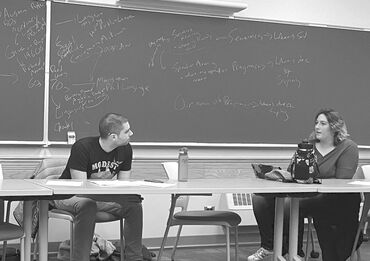
My Approach to Teaching Philosophy
There aren't many uncontroversial metaphilosophical theses, but I think most would agree that philosophy is not a spectator sport; the only way to really learn philosophy is to do it yourself. As a teacher of philosophy, my basic aim is to foster genuine philosophical engagement, such that students don't simply learn about philosophy but to really do it themselves. I see this engagement as coming in a few key forms. First, I aim to provide my students with the confidence to critically engage with primary texts through their written assignments, entering into dialogue with the various philosophers we are reading. Second, I work to create an inclusive environment where they can productively engage in philosophical conversation with one another. Finally, I am sure to open myself up to my students as someone with whom they can engage; I make myself accessible to them at every stage of the process of thinking or writing about philosophical issues, giving support and guidance while always encouraging them to exercise their own intellectual freedom. Full Teaching Statement
Courses Taught
Appearance and Reality: Perspectives Across Philosophical Traditions (Spring 2024, University of Chicago)
Introduction to Logic (Winter 2024, University of Chicago)
Doing Things with Words (Winter 2023, University of Chicago)
Philosophical Perspectives II (Winter 2023, Winter 2024, University of Chicago - Humanities Core)
Philosophy and Science Fiction (Fall 2022, University of Chicago)
Philosophical Perspectives I (Fall 2022, Fall 2023, University of Chicago - Humanities Core)
Consciousness and Language (Spring 2020, University of Chicago)
Courses Assisted
Philosophy of Religion, with Ben Callard (Winter 2021, University of Chicago)
Elementary Logic, with Michael Kremer (Winter 2021, University of Chicago)
Forms of Philosophical Skepticism, with James Conant (Spring 2019, University of Chicago)
Consciousness, with David Finkelstein (Fall 2019, University of Chicago)
Cognition, with Jason Bridges and Chris Kennedy (Spring 2018, University of Chicago)
Formal Logic, with Aron Edidin (Fall, 2013, New College of Florida)
Full teaching portfolio available upon request
To sign up for office hours click here.
There aren't many uncontroversial metaphilosophical theses, but I think most would agree that philosophy is not a spectator sport; the only way to really learn philosophy is to do it yourself. As a teacher of philosophy, my basic aim is to foster genuine philosophical engagement, such that students don't simply learn about philosophy but to really do it themselves. I see this engagement as coming in a few key forms. First, I aim to provide my students with the confidence to critically engage with primary texts through their written assignments, entering into dialogue with the various philosophers we are reading. Second, I work to create an inclusive environment where they can productively engage in philosophical conversation with one another. Finally, I am sure to open myself up to my students as someone with whom they can engage; I make myself accessible to them at every stage of the process of thinking or writing about philosophical issues, giving support and guidance while always encouraging them to exercise their own intellectual freedom. Full Teaching Statement
Courses Taught
Appearance and Reality: Perspectives Across Philosophical Traditions (Spring 2024, University of Chicago)
Introduction to Logic (Winter 2024, University of Chicago)
Doing Things with Words (Winter 2023, University of Chicago)
Philosophical Perspectives II (Winter 2023, Winter 2024, University of Chicago - Humanities Core)
Philosophy and Science Fiction (Fall 2022, University of Chicago)
Philosophical Perspectives I (Fall 2022, Fall 2023, University of Chicago - Humanities Core)
Consciousness and Language (Spring 2020, University of Chicago)
Courses Assisted
Philosophy of Religion, with Ben Callard (Winter 2021, University of Chicago)
Elementary Logic, with Michael Kremer (Winter 2021, University of Chicago)
Forms of Philosophical Skepticism, with James Conant (Spring 2019, University of Chicago)
Consciousness, with David Finkelstein (Fall 2019, University of Chicago)
Cognition, with Jason Bridges and Chris Kennedy (Spring 2018, University of Chicago)
Formal Logic, with Aron Edidin (Fall, 2013, New College of Florida)
Full teaching portfolio available upon request
To sign up for office hours click here.